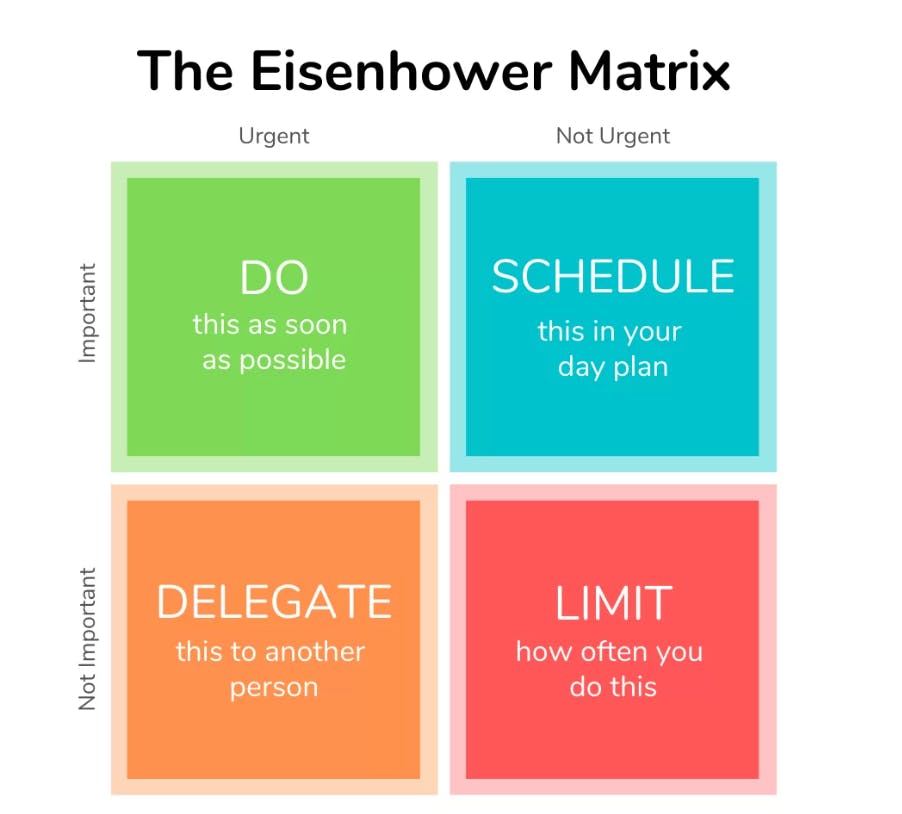Greetings, this is my inaugural blog post, and the primary subject I wish to discuss is the art of time management. I am not a time management expert; rather, I am sharing my insights regarding time and how I have improved my time utilization. In this blog, I will share my insights and lessons learned over the past two years. But does this mean I too implement everything? No, but I am constantly working on my relationship with time.
What are the reasons behind time management issues?
Acquiring the skill of time management can be a formidable task for individuals, including students and those from various backgrounds. The primary hurdle is often the lack of awareness of our priorities or which tasks to prioritize. To overcome this, a helpful tip is to commence with tasks that are urgent and require less than two minutes to complete if you have a lengthy list of tasks to tackle. It's crucial to discern which tasks are significant and which are not. Equally important is determining what to do as well as what not to do.
How to figure out what is not important to do?
Spending excessive time on trivial activities is a detrimental habit. For instance, imagine you are a college student with a full course load, part-time job, and extracurricular activities. You have an upcoming exam, an essay due, and a group project to complete. You also have social plans with friends, a hobby you enjoy, and some household chores to take care of. In this scenario, it's essential to prioritize your tasks and allocate your time wisely to ensure that you meet your academic and personal goals without feeling overwhelmed or burnt out.
To manage your time effectively, you need to prioritize your tasks based on their importance and urgency. You can begin with the critical tasks that require immediate attention and allocate more time and focus to them. Once you complete these high-priority tasks, you can move on to the less important ones or delegate them to someone else. By prioritizing your tasks, you can avoid wasting time on unimportant activities and ensure that you are making progress on what matters the most.
How to prioritize things?
Eisenhower Method:

The Eisenhower Matrix is a useful tool for enhancing productivity by categorizing various tasks based on their urgency and importance. Urgent tasks demand immediate attention and may have immediate consequences, whereas important tasks may not have immediate effects but contribute to long-term goals. The matrix highlights that not all urgent tasks are important, and not all important tasks are urgent, which challenges the common misconception that urgency equals importance.
Important and Urgent: The quadrant of Important and Urgent tasks comprises assignments with imminent deadlines, unexpected requests, and critical situations that demand immediate attention. This category tends to consume most of our time. For example, imagine you have an important exam coming up next week, but you also have a group project due on the same day. The project is important and needs to be completed, but studying for the exam is also crucial. Both tasks fall under the Important quadrant, but the exam preparation falls under the Important and Urgent quadrant. You have to prioritize your time and allocate resources accordingly, dedicating more time to studying for the exam and working on the project during breaks. Failing to prioritize the exam preparation may result in negative consequences, such as poor grades or even failing the course. By prioritizing the urgent task of exam preparation, you can address it promptly and avoid any potential setbacks.
Important but Not Urgent: The tasks that fall under the quadrant of Not Urgent but Important often involve leisure activities, physical exercise, self-care practices, personal development, and relaxation. These tasks may not have immediate deadlines or consequences, but completing them can significantly enhance our physical and mental well-being.
Urgent but Not Important: The tasks falling under the quadrant of Urgent but Not Important typically involve activities such as responding to emails and returning phone calls that demand prompt attention but do not contribute significantly to achieving long-term goals. To manage such tasks, delegation is a valuable skill that individuals should develop to free up time for more critical responsibilities. It is essential to assess whether a task is urgent or vital and consider delegating it to someone willing to assist. The ability to delegate effectively is just as crucial as identifying priorities and managing time efficiently.
Not Urgent and Not Important: These are unimportant activities that tend to decrease productivity, such as excessive use of social media and watching television. While it is essential to take breaks from work and other responsibilities, it is crucial to avoid spending an excessive amount of time on these activities.

What are the hacks for time management?
Plan your day ahead of time: Spend a few minutes at the end of each day to plan out your schedule for the next day, identifying your most important tasks and allocating time for each of them. Use ToDo apps or Notion for this purpose.
Eliminate distractions: Try to minimize distractions by turning off notifications on your phone or using apps that block distracting websites or apps during work hours. Use time-blocking apps or Digital Wellbeing for this purpose.
Break down tasks: Large tasks can feel overwhelming, so try breaking them down into smaller, more manageable chunks to help you stay motivated and focused.
Prioritize ruthlessly: Be realistic about what you can accomplish in a day, and focus on completing the most important tasks first.
Use the two-minute rule: If a task takes less than two minutes to complete, do it right away instead of putting it off.
Batch similar tasks together: Grouping similar tasks, such as answering emails or making phone calls, can help you work more efficiently.
Use the Pomodoro Technique: This technique involves breaking work into 25-minute intervals, followed by a short break of 5 minutes, to help you stay focused and motivated. Don't use phone or open social media during that short break. You can simply drink water or do some stretching or maybe go out for a little walk. After 4-5 pomodoros, take a long 30-minute break.
Delegate tasks: If possible, delegate tasks to others to free up your time for more important tasks.
Learn to say no: Don't be afraid to say no to requests that are not a priority or that will take up too much of your time.
Is it okay to say "NO"?
Many individuals underestimate the power of saying "no." Often, people find themselves in situations where they are asked for small favors or to attend unnecessary events, and they may hesitate to decline for fear of appearing rude.
But the truth is, it is perfectly acceptable to refuse a request because it is your time and you have the right to prioritize your commitments. Unfortunately, this is not emphasized enough in traditional education. We are taught what to do, but not what not to do. It is a common misconception that saying "yes" to everything will help us get ahead in our careers or academic pursuits.
However, it is important to recognize this fallacy early on. You don't have to be impolite when saying "no." You can still be sympathetic and simply respond with "I'm sorry, I'm not available." You don't owe anyone an explanation for your decision. It is recommended that you consider the importance of the task, the amount of time you have, and your reasons for saying "yes" or "no."
How to deal with procrastination?
Delaying work is often due to the perception of the amount of work that needs to be done or the difficulty of the task. Here are some ways to overcome this:
Finish immediate tasks: Tackle tasks that can be done immediately, rather than putting them off. This approach frees up time and reduces the feeling of being overwhelmed.
Break up larger tasks: Divide larger tasks into smaller, more manageable parts. This makes it easier to focus on one part at a time, rather than being intimidated by the task as a whole.
Change your perspective: Try to shift your perspective from a negative one to a positive one. Celebrate small accomplishments and let go of the idea of perfectionism.
Avoid exaggerating: Avoid making a big deal out of tasks. Often, people exaggerate the difficulty of a task and create unnecessary stress for themselves.
Focus on the purpose: Keep the purpose of the task in mind. Focus on the benefits of completing the task, rather than the negative aspects of doing it. For instance, think about how good it will feel to have a clean and organized closet.
How to balance college studies and other work?
Establishing a routine can be beneficial, but it's equally important to voice your thoughts. The significant difference between successful and unsuccessful individuals is their willingness to speak up. Remaining silent will not solve any problems. For instance, if you find a college assignment or project too overwhelming, communicate your concerns to your professors or academic advisors, and explain why the task is challenging. They may offer advice or assist you in breaking down the assignment into smaller tasks. It's crucial to communicate honestly and effectively to receive appropriate support. Therefore, don't hesitate to speak up and seek help when needed.
So yes, this concludes the blog. I hope you found this blog informative and useful. Thank you for taking the time to read it. Keep an eye out for more blogs like this in the future.
On Twitter, you can follow me at imKaustav_. I create blogs on programming, front-end technology, and other topics.

